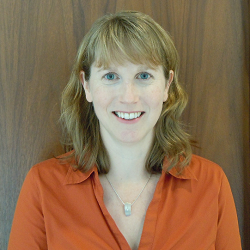Mentorship can take many forms. In this interview with NRMN, Lucy R. Forrest, Ph. D. of the National Institute of Neurological Disorders and Stroke (NINDS) shares thoughts on the valuable experience she has had as a mentor within an NRMN virtual mentorship.
After creating a free account on NRMNet.net and navigating to the virtual mentorship application, mentees and mentors create profiles on the virtual mentoring platform in response to questions about themselves and about their preferred match. Mentees are recommended mentors based on the compatibility of their profiles and may invite one mentor at a time. Once the mentor accepts, their guided virtual mentorship begins. The pair communicate weekly by any convenient method (video chat, phone, email, etc.). NRMN sends suggested topics by email to help spark discussion.
 Dr. Forrest received her DPhil in Biochemistry from the University of Oxford. Subsequent to receiving her Ph.D. degree, she carried out postdoctoral research at the Johns Hopkins University School of Medicine, at the Medical Research Council Dunn Human Nutrition Unit, Cambridge, UK and at Columbia University, New York, NY. From 2007, Dr. Forrest was Max Planck Research Group Leader at the Max Planck Institute for Biophysics in Frankfurt, Germany. In August 2013, Dr. Forrest joined NINDS. Her laboratory at the NIH focuses on important questions relating to membrane proteins, spanning specific mechanisms of individual proteins through to general biophysical principles. Her research tools are computational and her studies are designed to inspire clear hypotheses, which are tested in close collaboration with experimental laboratories.
Dr. Forrest received her DPhil in Biochemistry from the University of Oxford. Subsequent to receiving her Ph.D. degree, she carried out postdoctoral research at the Johns Hopkins University School of Medicine, at the Medical Research Council Dunn Human Nutrition Unit, Cambridge, UK and at Columbia University, New York, NY. From 2007, Dr. Forrest was Max Planck Research Group Leader at the Max Planck Institute for Biophysics in Frankfurt, Germany. In August 2013, Dr. Forrest joined NINDS. Her laboratory at the NIH focuses on important questions relating to membrane proteins, spanning specific mechanisms of individual proteins through to general biophysical principles. Her research tools are computational and her studies are designed to inspire clear hypotheses, which are tested in close collaboration with experimental laboratories.
Q1: How did you get involved with NRMN?
A1: I heard about NRMN through a mentoring workshop being held at my institution, the NIH; one of the organizers mentioned NRMN, and I thought it sounded like an excellent program, with the potential to have a powerful impact. I have recently become very interested in increasing the accessibility and inclusivity of science, and NRMN seemed like a way to have a direct influence. So I signed up as a mentor.
Q2: Describe your role in GVM, and tell us a little about your experience in that role.
A2: I am currently acting as a virtual mentor for a female Ph.D. student of color, who was struggling with how to navigate a program over two institutions with two different advisors, each with their own goals. We use complementary scientific tools, and so I was able to understand some of the challenges specific to my mentee’s field. We have met online multiple times, for an hour each time, which has allowed us to get to know each other quite well. Early on, we met once every two weeks, but our visits have become less frequent as she has figured out how to maneuver through her complex situation; it has been great to see her gain some sense of control over and hope for her future.
Some of the time, I was merely a useful sounding board in what is, after all, a stressful time for all Ph.D. candidates. Other times I helped to “interpret” the motivations of her advisors – since I have been in their shoes! This has had the interesting side effect of reminding me what it can be like for the person on the other end of my own actions as a supervisor. It has also been incredibly gratifying to have been able to provide specific advice that she could successfully implement, for example, in terms of how to maximize her interactions with her advisors, and how to manage her projects and time effectively to hopefully help her cross the finish line with her Ph.D. We also discussed a number of international programs for further training that I am familiar with having worked in several different countries.
Q3: Have you participated in other similar programs in the past? If so, how was your experience with NRMN different or unique?
A3: I have never participated in anything like NRMN previously. I have been a mentor directly to many undergraduates, Ph.D. students and postdocs at various stages in my career, including now as a principle investigator, but most of them were within my team. Most mentoring programs rely on proximity and overlapping communities, which limits the amount of directly relevant expertise and experiences the mentor might have had. By contrast, NRMN provides a bridge across space and scientific fields, by allowing mentees to search for the mentor whose experience seems most appropriate for their own particular challenges.
Q4: If someone called you and asked, “Why should I become involved with NRMN?” how would you respond?
A4: I can only speak as a mentor, but I would say if you believe that science would benefit from diversity, and you have a just little time to give, it can be an extremely rewarding exercise. If you are a Professor, it can provide insight into what your own students may be going through and how your actions may be affect them, and therefore has the potential to help you be a more successful leader.